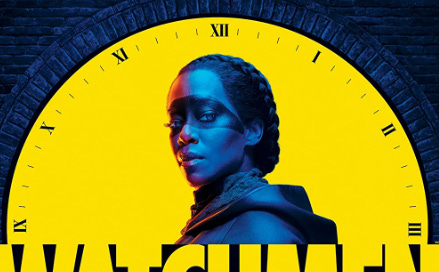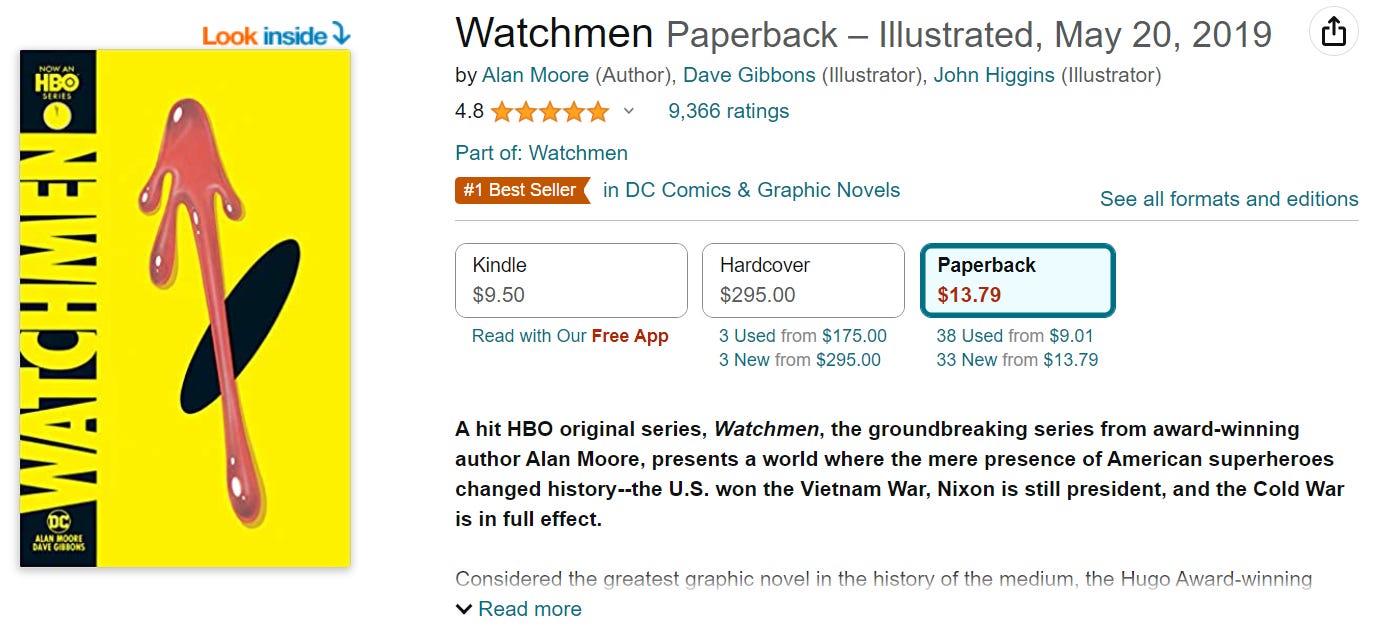With the start of the Writer’s Guild strike, I thought it would be a good time to revisit what I consider one of the best written shows of all-time, 2017’s limited series, “Watchmen.” Not only does it still stand up, but seeing it a second time brings that much more attention to the clues, motifs, stories and surprises that you missed the first time around. The writing is so sharp that small, otherwise unnoticeable, trivial things play important, outsized roles the more you know and understand what is occurring. It’s even better watching again.
For those who haven’t seen it, don’t worry, I’m not going to spoil anything. What I will do though is provide some history, particularly for those unfamiliar with the classic ‘80s Alan Moore/Dave Gibbons comics it is based from, so that they can start watching it and not feel like they are completely lost.1 There are a lot of similarities and references to the television series, but it doesn’t take much to understand.
Background: Watchmen, The Comic Book/Movie
Setting: The timeline for Watchmen is an alternative history; the time is 1985 and Richard Nixon has just been elected to his fourth term. In this timeline, we won the Vietnam War and it is now the 51st state. Most of the story takes place in a darker, grittier New York, though it does offer a few other places as the story goes on.
Characters: Most of the characters are masked vigilantes. In the post WWII time period they were referred to as “the Minutemen.” The pertinent ones here are:
Hooded Justice, considered the first masked vigilante.
The Comedian, Edward Blake, a sarcastic right wing military man who likes to shoot and blow up stuff. To him, everything is a big joke no matter how serious it is. The kind of guy who likes to shoot hippie protesters.
Sally Jupiter, known as Silk Spectre, an attractive woman and member of the Minutemen.
Times change and a new generation comes up and replaces them. Referred to as “The Watchmen” (Who watches the watchmen?) they are reviled and untrusted. Thus, the vigilantes go undercover, and its against the law for them to do what they do (except for the Comedian and Doctor Manhattan, who both work for the government). Those in this group are:
Adrian Veidt, the world’s smartest man. He goes by the name “Ozymandias” and is so quick he can catch a bullet with his bare hand.
Walter Kovacs, a.k.a. Rorschach, who is a private detective type. He wears a mask with an inkblot on it and is prone to conspiracy theories.
Daniel Dreiberg, who is an inventor. He has a persona of “Nite Owl.”
Jon Osterman, who becomes through a scientific accident, a god-like being named “Doctor Manhattan.” Dr. Manhattan and the Comedian are single handedly responsible for winning the Vietnam War in a single day when Manhattan kills an army with the wave of his hand and the rest of Vietnam begins worshipping him as a god. He’s pretty lusty, emotionally detatched from everyone, and objectively honest and indifferent to a fault.
Laurie Jupiter, Sally’s daughter, who takes up the mantle of Silk Spectre II.
Plot: The world sits on the precipice of World War III. Early on in the story, the Comedian is killed. Nite Owl and Rorschach begin investigating who did it. There are constant motifs of clocks, smiley faces, hyper-violent acts, and an irony at odds with most comic books made before this came out; that is what makes Watchmen so revolutionary, the protoypical “heroes” are in fact “anti-heroes” and have dark sides. That trope has been appropriated by pretty much every comic since then, but its also what has made them more popular than ever. Its the difference between Batman played by Adam West or by Christian Bale.
Now, you can you read the comics, or watch the movie to see how it turns out. However, the most important thing to remember is that WWIII is averted with the use of a giant squid teleported and landing in NY. (Yes, you read that right). In the context of the story, this actually makes perfect sense, and is an event that you see first hand in the television series.
Watchmen, the TV series
Now that we got some of that out of the way, the series is a sequel of sorts to the Watchmen comic/movie, taking place 30 years after the original’s events. It’s still an alternative timeline, and this time Robert Redford is entering his fourth term as President. A few of the characters return older, wiser. The motifs are a little different focusing this time on legacies; seeds, eggs, acorns, and babies are constantly references in the context of legacies. Not all of those legacies are good though. In fact, it has a lot to say about America’s racial legacy, starting with the very first scene, which is as brutal as it is honest.
How that is woven into the plot is part of its genius. Some of the things alluded to in the original story are presented visually here. However, what really makes the series phenomenal is how it weaves what appears to be extraneous threads and one off items into the larger, overall portrait. There is even a whole character who has a plotline all to himself, seemingly entirely unrelated to everything else going on (and as you’re watching that plot you seriously wonder what the hell is going on), that you don’t see and could never guess how it’s tied to the other events until the very last two episodes.
Like the original story, costumed figures play a role, but this time its the cops who are hiding their faces. Like all comic book figures, there are elaborate backstories. Watchmen is so excellent because the backstories all makes rational sense; Batman wears his suit to strike fear into criminals, these people do it largely out of lacking courage against their own fears. There’s even an uber-violent television show everyone watches “American Hero Story” giving a pseudo-backstory of one of the Minutemen, “Hooded Justice.” All of these things intersect together beautifully and in unexpected ways.
But comic book characters are typically caricatures. They’re usually single dimensional beings with alternate identities but without nuance or complexity. What Watchmen gets right is that everyone is not black and white, good or bad. People have depths and layers to them, even costumed vigilantes.
One episode in particular, “This Extraordinary Being” is one of the single best scripted hours ever made. That’s NOT hyperbole either. IT IS THE SINGLE BEST WRITTEN EPISODE OF TELEVISION EVER. We see an entire life through someone else’s eyes, and its an incredible experience. To talk any further about it would be tantamount to ruining the experience for you. Nonetheless, it will change the way you view what television can show you.
The twists and turns come aplenty all the way through to the final episode, where it all comes together in a perfect denouement. Everything is tied up in a bow, not just for the series, but for some open threads from the comics.
And that is a fitting legacy indeed.
PurpleAmerica’s Recommended Stories
The original Comic was commended by Time Magazine as one of the most influential books of the 20th Century. Indeed, the comic book renaissance since the 1980s owes a lot to the original graphic novel.
https://www.amazon.com/Watchmen-2019-Alan-Moore/dp/1779501129/ref=asc_df_1779501129/?tag=hyprod-20&linkCode=df0&hvadid=366433089512&hvpos=&hvnetw=g&hvrand=17564000481550647338&hvpone=&hvptwo=&hvqmt=&hvdev=c&hvdvcmdl=&hvlocint=&hvlocphy=9019498&hvtargid=pla-794542662614&psc=1&tag=&ref=&adgrpid=78795691880&hvpone=&hvptwo=&hvadid=366433089512&hvpos=&hvnetw=g&hvrand=17564000481550647338&hvqmt=&hvdev=c&hvdvcmdl=&hvlocint=&hvlocphy=9019498&hvtargid=pla-794542662614
PurpleAmerica’s Obscure Fact of the Day
A constant theme in the comics/movie/series is who the ultimate authority should be, who has complete power over everyone else. The phrase “Who watches the Watchmen” actually originally comes from Aristotle. Plato had a theory abut who should be the ultimate, infallible authority of a city-state, and Aristotle responded “Pios, tha, filatei tus filakes?”— Who watches the watchmen?
In the graphic novel the phrase is never fully seen, always partially covered or incompletely written.
PurpleAmerica Cultural Criticism Corner
The Zach Snyder movie is not flawless by any means. I give credit to him for trying to film something that was largely seen previous to that as unfilmable. In that sense, the movie is a pretty ambitious achievement and generally entertaining.
Jackie Earle Haley and Billy Crudup are excellent as Rorschach and Doctor Manhattan respectively. Unfortunately, there’s also some less interesting acting choices involved as well. On that end, it contains probably the single worst love scene ever put to film, soundtracked by Leonard Cohen’s Hallelujah. No, I am not kidding on that. It’s painfully bad.
Nonetheless, the film has developed a cult following over the years, and frankly, I’d love to see it get the limited series treatment HBO gave the “sequel” series.
Footnotes and Parting Thoughts
Let me know what you think of the page. Please share and comment!
This is basically from my wife, who doesn’t know a thing about the original Watchmen, enjoyed parts of this series, but felt a little left out on many of the sly “in” references that the series puts up. There are characters and references from the original series, but to her (and to others who didn’t read or see the Zach Snyder movie, they just don’t get it).









